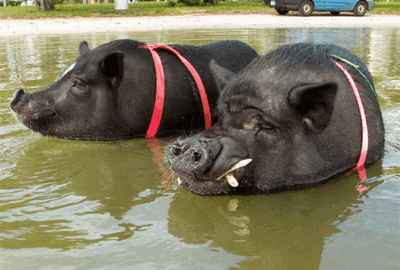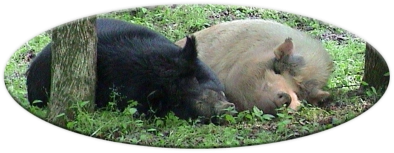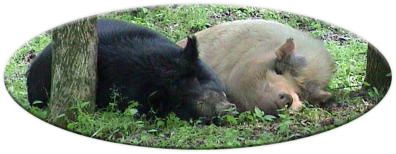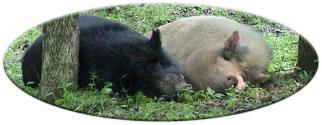
Fun Piggy Facts

© 2004 - 2025 Designed by Wimberly’s Web Works

Fun Piggy Facts
Potbelly pigs are native to Southeast Asia. Potbelly pigs are social animals and community is crucial to their happiness and well-being. Teacup pigs or mini pigs are a myth. Most healthy adult potbelly pigs weigh between 120 and 180 pounds. Potbelly pigs were originally solid black in color. Now it’s common to see pink, white and spotted pigs. Potbelly pigs are opportunistic omnivores, meaning they will eat just about anything. They do best on a vegetarian diet. Potbelly pigs form close bonds with people and they each have their own personality. Potbelly pigs have very strong snouts and a keen sense of smell and have been used by some police departments to sniff out drugs. (Note from SCAMPP Member: I can attest to their strong snouts and keen sense of smell! Willy ripped into my flight attendant suitcase for toothpaste! Smeared it all over the carpet … but his breath was minty fresh! He has ripped purses and backpacks apart to get a single jellybean or whatever edible forgotten about. He probably thinks his middle name is “you’ve got to be kidding me”.) Pigs roll in the mud to cool their skin because they have no sweat glands and can't sweat. Some farmers use sprinklers to keep their pigs cool. Some pig owners use misters or kiddie pools for their pet pigs. Pigs are 4th on the intelligence list. (Humans are first, non-human primates are second, dolphins/whales are third and pigs are fourth.) With such brains, pigs can learn very quickly. Despite popular belief, pigs are one of the cleanest animals there are. When given a choice, pigs are particular about not going to the bathroom anywhere near where they live or eat and usually always go in the same spot. The world's largest litter of pigs was 37 piglets! Most pigs have 8- 12 babies at one time. Their gestation period is easy to remember: 3 months, 3 weeks, 3 days. Pigs can scream LOUD. The scream of a jet engine taking off measures 113 decibels. The scream of a frightened pig can measure 115 decibels. Pigs generally don't have fleas or ticks because a pig's skin is too thick. Be careful of ticks because ticks can burrow into the softer areas of a pig's skin, such as their ears, tummy and armpits. Pigs can make great pets for people with allergies because they don't have fur, but instead have bristles. Like other animals, pigs can have different colors of hair (meaning “bristles”). Pigs are found on almost every continent… except Antarctica. Pigs can live to be 12 to 20 years-old! Some have been known to live past 20 years old. If you are looking for a pet that's a little different, then a potbellied pet pig is the perfect choice … but first check to make sure you are zoned and that you are properly educated about their needs and characteristics. Potbelly pigs are very quiet (unless threatened. provoked or scared). Potbelly pigs can do tricks a dog never thought of. Potbelly pigs can be kept as house-pets and litter-box trained. Potbelly pigs don't keep the neighbors awake all night barking like some dogs do. Potbelly pigs don't stink (except for un-neutered male pigs). Potbelly pigs don't jump up on furniture or counter-tops like cats (however, some owners let their pigs on the sofa or in bed with them). Potbelly pigs can be trained to use a pet ramp and walk on a leash. Potbelly pigs can make great pets if treated with love and respect and are healthy. If you want to get a pet potbellied pig, please adopt, don’t buy from a breeder and make sure you can love and care for it for its entire lifetime. Shelters, sanctuaries, and foster care locations are overflowing with pigs that people can no longer keep for various reasons. SCAMPP can help you adopt a potbellied pig as they receive many calls and e-mails from people who can no longer keep their pet pigs. Potbelly pigs can make terrific pets… but only for the right people. Research proper information on potbellied pigs as pets prior to deciding to own one (some micro-mini teacup breeders do not give you proper information!). There is a lot to learn, please click here for our Piggy Informational articles. BACK TO TOP






























- Home
- About SCAMPP
- Mission Statement and Disclosures
- What We Do
- SCAMPP PSA Video
- Event Info & Event Photos
- Membership - Join or Renew
- SCAMPP Meetings
- Sample SCAMPP Newsletters
- Photos - SCAMPP Pigs
- Piggy Vet & Hoof Trimmers List
- TeaCup Pig Info/Photos
- TeaCup Pig Myth
- Before You Get a Miniature Pig
- Piggy Info Articles
- Adoption Links
- Piggy Resources & Sanctuaries
- Piggy Videos
- Piggy Facts
- Disaster Preparation
- How You Can Help
- Donations
- Site Map
- Guest Book
- Contact Info

Fun Piggy Facts

© 2004 - 2025 Designed by Wimberly’s Web Works

Fun Piggy Facts
Potbelly pigs are native to Southeast Asia. Potbelly pigs are social animals and community is crucial to their happiness and well-being. Teacup pigs or mini pigs are a myth. Most healthy adult potbelly pigs weigh between 120 and 180 pounds. Potbelly pigs were originally solid black in color. Now it’s common to see pink, white and spotted pigs. Potbelly pigs are opportunistic omnivores, meaning they will eat just about anything. They do best on a vegetarian diet. Potbelly pigs form close bonds with people and they each have their own personality. Potbelly pigs have very strong snouts and a keen sense of smell and have been used by some police departments to sniff out drugs. (Note from SCAMPP Member: I can attest to their strong snouts and keen sense of smell! Willy ripped into my flight attendant suitcase for toothpaste! Smeared it all over the carpet … but his breath was minty fresh! He has ripped purses and backpacks apart to get a single jellybean or whatever edible forgotten about. He probably thinks his middle name is “you’ve got to be kidding me”.) Pigs roll in the mud to cool their skin because they have no sweat glands and can't sweat. Some farmers use sprinklers to keep their pigs cool. Some pig owners use misters or kiddy pools for their pet pigs. Pigs are 4th on the intelligence list. (Humans are first, non-human primates are second, dolphins/whales are third and pigs are fourth.) With such brains, pigs can learn very quickly. Despite popular belief, pigs are one of the cleanest animals there are. When given a choice, pigs are particular about not going to the bathroom anywhere near where they live or eat and usually always go in the same spot. The world's largest litter of pigs was 37 piglets! Most pigs have 8-12 babies at one time. Their gestation period is easy to remember: 3 months, 3 weeks, 3 days. Pigs can scream LOUD. The scream of a jet engine taking off measures 113 decibels. The scream of a frightened pig can measure 115 decibels. Pigs generally don't have fleas or ticks because a pig's skin is too thick. Be careful of ticks because ticks can burrow into the softer areas of a pig's skin, such as their ears, tummy and armpits. Pigs can make great pets for people with allergies because they don't have fur, but instead have bristles. Like other animals, pigs can have different colors of hair (meaning “bristles”). Pigs are found on almost every continent… except Antarctica. Pigs can live to be 12 to 20 years-old! Some have been known to live past 20 years old. If you are looking for a pet that's a little different, then a potbellied pet pig is the perfect choice … but first check to make sure you are zoned and that you are properly educated about their needs and characteristics. Potbelly pigs are very quiet (unless threatened. provoked or scared). Potbelly pigs can do tricks a dog never thought of. Potbelly pigs can be kept as housepets and litter-box trained. Potbelly pigs don't keep the neighbors awake all night barking like some dogs do. Potbelly pigs don't stink (except for un-neutered male pigs). Potbelly pigs don't jump up on furniture or countertops like cats (however, some owners let their pigs on the sofa or in bed with them). Potbelly pigs can be trained to use a pet ramp and walk on a leash. Potbelly pigs can make great pets if treated with love and respect and are healthy. If you want to get a pet potbellied pig, please adopt, don’t buy from a breeder and make sure you can love and care for it for its entire lifetime. Shelters, sanctuaries, and foster care locations are overflowing with pigs that people can no longer keep for various reasons. SCAMPP can help you adopt a potbellied pig as they receive many calls and e-mails from people who can no longer keep their pet pigs. Potbelly pigs can make terrific pets… but only for the right people. Research proper information on potbellied pigs as pets prior to deciding to own one (some micro-mini teacup breeders do not give you proper information!). There is a lot to learn, please click here for our Piggy Informational articles. BACK TO TOP






























- Home
- About SCAMPP
- Mission Statement & Disclosures
- What We Do
- SCAMPP PSA Video
- Event Info & Event Photos
- Membership - Join or Renew
- SCAMPP Meetings
- Sample SCAMPP Newsletters
- Photos-SCAMPP Pigs
- Piggy Vet & Hoof Trimmers List
- TeaCup Pig Info/Photos
- TeaCup Pig Myth
- Before You Get a Miniature Pig
- Piggy Info Articles
- Adoption Links
- Piggy Resources & Sanctuaries
- Piggy Videos
- Piggy Facts
- Disaster Preparation
- How You Can Help
- Donations
- Site Map
- Guest Book
- Contact Info

Fun Piggy Facts

© 2004 - 2025 Designed by Wimberly’s Web Works

Fun Piggy Facts
Potbelly pigs are native to Southeast Asia. Potbelly pigs are social animals and community is crucial to their happiness and well-being. Teacup pigs or mini pigs are a myth. Most healthy adult potbelly pigs weigh between 120 and 180 pounds. Potbelly pigs were originally solid black in color. Now it’s common to see pink, white and spotted pigs. Potbelly pigs are opportunistic omnivores, meaning they will eat just about anything. They do best on a vegetarian diet. Potbelly pigs form close bonds with people and they each have their own personality. Potbelly pigs have very strong snouts and a keen sense of smell and have been used by some police departments to sniff out drugs. (Note from SCAMPP Member: I can attest to their strong snouts and keen sense of smell! Willy ripped into my flight attendant suitcase for toothpaste! Smeared it all over the carpet … but his breath was minty fresh! He has ripped purses and backpacks apart to get a single jellybean or whatever edible forgotten about. He probably thinks his middle name is “you’ve got to be kidding me”.) Pigs roll in the mud to cool their skin because they have no sweat glands and can't sweat. Some farmers use sprinklers to keep their pigs cool. Some pig owners use misters or kiddy pools for their pet pigs. Pigs are 4th on the intelligence list. (Humans are first, non-human primates are second, dolphins/whales are third and pigs are fourth.) With such brains, pigs can learn very quickly. Despite popular belief, pigs are one of the cleanest animals there are. When given a choice, pigs are particular about not going to the bathroom anywhere near where they live or eat and usually always go in the same spot. The world's largest litter of pigs was 37 piglets! Most pigs have 8-12 babies at one time. Their gestation period is easy to remember: 3 months, 3 weeks, 3 days. Pigs can scream LOUD. The scream of a jet engine taking off measures 113 decibels. The scream of a frightened pig can measure 115 decibels. Pigs generally don't have fleas or ticks because a pig's skin is too thick. Be careful of ticks because ticks can burrow into the softer areas of a pig's skin, such as their ears, tummy and armpits. Pigs can make great pets for people with allergies because they don't have fur, but instead have bristles. Like other animals, pigs can have different colors of hair (meaning “bristles”). Pigs are found on almost every continent… except Antarctica. Pigs can live to be 12 to 20 years-old! Some have been known to live past 20 years old. If you are looking for a pet that's a little different, then a potbellied pet pig is the perfect choice … but first check to make sure you are zoned and that you are properly educated about their needs and characteristics. Potbelly pigs are very quiet (unless threatened. provoked or scared). Potbelly pigs can do tricks a dog never thought of. Potbelly pigs can be kept as housepets and litter- box trained. Potbelly pigs don't keep the neighbors awake all night barking like some dogs do. Potbelly pigs don't stink (except for un-neutered male pigs). Potbelly pigs don't jump up on furniture or countertops like cats (however, some owners let their pigs on the sofa or in bed with them). Potbelly pigs can be trained to use a pet ramp and walk on a leash. Potbelly pigs can make great pets if treated with love and respect and are healthy. If you want to get a pet potbellied pig, please adopt, don’t buy from a breeder and make sure you can love and care for it for its entire lifetime. Shelters, sanctuaries, and foster care locations are overflowing with pigs that people can no longer keep for various reasons. SCAMPP can help you adopt a potbellied pig as they receive many calls and e-mails from people who can no longer keep their pet pigs. Potbelly pigs can make terrific pets… but only for the right people. Research proper information on potbellied pigs as pets prior to deciding to own one (some micro-mini teacup breeders do not give you proper information!). There is a lot to learn, please click here for our Piggy Informational articles. BACK TO TOP






























- Home
- About SCAMPP
- Mission Statement and Disclosures
- What We Do
- SCAMPP PSA Video
- Event Info & Event Photos
- Membership - Join or Renew
- SCAMPP Meetings
- Sample SCAMPP Newsletters
- Photos - SCAMPP Pigs
- Piggy Vet & Hoof Trimmers List
- TeaCup Pig Info/Photos
- TeaCup Pig Myth
- Before You Get a Miniature Pig
- Piggy Info Articles
- Adoption Links
- Piggy Resources & Sanctuaries
- Piggy Videos
- Piggy Facts
- Disaster Preparation
- How You Can Help
- Donations
- Site Map
- Guest Book
- Contact Info














